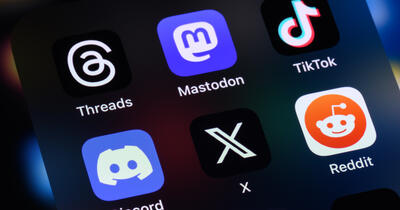
In the Battle of Meta versus X, Consumers, and Our Privacy, Lose
Investing in safe, inclusive online communities should not be mutually exclusive from building a business.

In June, Elon Musk, the owner of X, the company formerly known as Twitter, challenged Meta’s Mark Zuckerberg to a cage match after news broke that Meta was releasing an app to compete with Twitter. It was news because the feud involved the heads of two companies with outsize power over our economy and government. When Threads reached 100 million users in five days, pundits implied that Zuckerberg had somehow won.
As entertaining as a billionaire cage match is, the fight is not about which obscenely wealthy man and his company should “win.” A win for either is a loss for consumers, privacy, and our politics. For us, this tension is internal. We’re grappling with our position as an organization dedicated to breaking up corporate power and corporations’ outsize influence on our economy and democracy that also uses social media to share our messages, build partnerships, and engage with our communities. It’s a tension we’ll have to live with as long as social media remains as much of a tool for community building and organizing as it is for billionaire wealth. So before swearing off social media entirely or rooting for a billionaire, we should root for robust anti-trust policies.
And we should do so while Threads and other emerging platforms are still young. Yes, Threads has fewer trolls and bots than Twitter, but that doesn’t mean it is free from harassment, hate speech, or disinformation. All three will grow without robust content moderation and policies against algorithmic manipulation and disinformation. A coalition of 24 civil-rights, digital justice, and pro-democracy groups led by The Free Press, Accountable Tech, and Media Matters for America previously sent a letter to Meta calling on the company to immediately release policies designed to protect user privacy, prevent harassment, and control algorithmic bias and privacy violations.
The need for robust regulation and content moderation is especially critical as the 2024 presidential election approaches. As Nora Benavidez, Free Press senior counsel and director of digital justice and civil rights, said, “It’s especially urgent for Meta to take action as we see many prominent social-media networks retreat from the sort of health and safety standards that are essential to slowing the spread of election-related disinformation." Investing in safe, inclusive online communities should not be mutually exclusive from building a business.
Investing in safe, inclusive online communities should not be mutually exclusive from building a business.
Unfortunately, like many of the biggest tech companies, Meta already profits from violating our privacy. They harvest our data and then sell it to advertisers, who use that data to sell us their products and maintain their monopolies.
And those monopolies are not slowing down. As we have previously written, corporate concentration “has grown to levels not seen since before the Great Depression. At the current rate of corporate consolidation, only one U.S. company will exist in 2070.” Big tech companies like Amazon, Apple, Google, Meta, and Microsoft are not only preventing competition but have emerged as some of the biggest drivers of economic inequality in recent decades.
When anyone tries to challenge these practices, whether it’s unionizing workers fighting for fair pay and working conditions, government officials proposing higher corporate taxes, regulators attempting to strengthen anti-trust laws, or even a small start-up with a new product, these companies will use their money and lobbying influence to fight them.
But consumers and workers can fight too. Multiple avenues exist, including regulating competition to break up monopolies, modernizing antitrust legislation and restoring federal agencies' regulatory and enforcement power, and creating a more equitable tax code that makes large corporations pay their fair share. A reinvigorated competition and antitrust agenda that shifts power to Black and brown communities harmed by rising corporate concentration is essential to ensure these digital communities can thrive.
A reinvigorated competition and antitrust agenda that shifts power to Black and brown communities harmed by rising corporate concentration is essential to ensure these digital communities can thrive.
We can revise and reintroduce existing legislation, like the bipartisan American Online Choice and Innovation Act, among other bills that would break up big tech, and the PRO (Protecting the Right to Organize) Act, which would strengthen worker power and make unionization and collective bargaining easier for workers across industries. We can also finally work to get corporate money out of politics, so tech companies can stop influencing the institutions which regulate them. Finally, we can follow the lead of our grassroots partners around the country, as outlined in our explainers and economic democracy case studies, standing up to Amazon, winning historic investments for climate change mitigation, and building a public bank. Tech companies can collaborate with civil rights and tech accountability organizations to make safe platforms.
The blueprint exists; our leaders and tech companies are missing political will.


